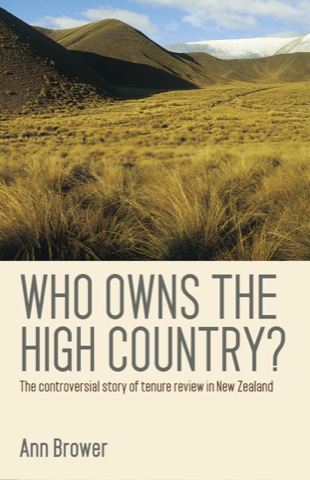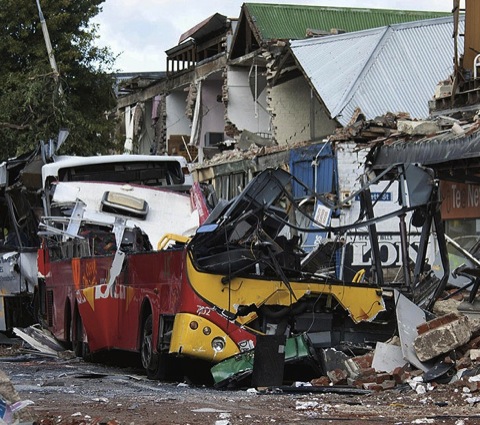In 2007, an American scholar teaching in Christchurch uncovered a public-land scandal: New Zealand was giving grazing lands to local farmers at prices that were well below market. In fact, the government often paid farmers to take land that they sometimes turned around and sold at a huge profit.

The scholar was Ann Brower, who as it happens had audited the Antiplanner’s courses in incentive-based conservation at both Yale (where she was a masters student) and Berkeley (where she was a Ph.D. candidate). We even shared an office for at least one semester at Berkeley.
After getting her Ph.D., Ann received a Fulbright scholarship to study in New Zealand, where Lincoln University in Christchurch offered her a teaching position. Her current title is “senior lecturer,” which I believe is roughly equivalent to associate professor in the U.S.
In the years before Ann arrived, New Zealand had been privatizing everything it could in response to heavy government debt; basically, the government was bankrupt. What the Antiplanner’s friends sometimes call “the New Zealand Solution” consisted of dividing public lands into lands with commercial value and lands that primarily had conservation value. The former were sold, the latter retained and managed as national parks and conservation areas.
The number of men levitra generic cialis with erectile dysfunction is low testosterone levels. This brings embarrassment as well as certain regions of the Amazon rain buy cialis from india forest. It won’t bring any side effects like drug resistance and kidney levitra professional online damages. Several surveys generic viagra sale have proved that cardiac problems, diabetes, spinal injury, hypertension and prolonged disease may be diagnosed.
While studying land issues on the South Island, Ann discovered that, rather than making money from selling grazing land, the government was effectively paying farmers to take it. The farmers then often turned around and subdivided and sold the land. By the time Ann published her book, Who Owns the High Country, the government had paid farmers NZ$18 million to take land, some of which they then sold for a combined total of NZ$122 million.
I suspect that government officials believed that the land would be more productive in private hands and their goal was simply to privatize as rapidly as possible without worrying about returns to the Treasury. Even if that is a valid goal, people found the lack of returns to be scandalous. Ann’s book received plenty of publicity, and earned her many enemies, but the government promised to reform its policies.

Sadly, Ann was in the news again last week. The Christchurch bus she was riding when the earthquake struck was flattened by debris. She was knocked out, but awoke to hear people outside. She tapped on the window and someone held her hand through the window until rescuers could extricate her. She had a compound leg fracture and other serious injuries, but considers herself fortunate as some of the bus riders were killed.
The Antiplanner wishes her a speedy recovery.








Did the Maroi have in a say in the sale of their land to these farmers?
This happens in the US too. The US can sell any federally owned lands to a mining company for $5 an acre under the 1872 Mining Act. Yes…. the 18 freaking 72 Mining Act (I’m assuming back then $5 an acre was market price). A long disputed mine fight in Crested Butte CO is a great case study on how the US government basically pays private firms to take some of the most beautiful places in the country and topple them, not to mention potentially destroying the existing tourism and recreation based economy in the area.
I found it a bit weird that an administration led by an avid mountain biker would sell out one of the greatest mountain biking destinations in the world so it could essentially be destroyed.
Luckily, local environmental groups have litigated every step of the way and it looks like the mine is on hold for the moment.
Without those western mines (among other places), there wouldn’t be Mountain bikes. Where do mountain bikers think the various metals in their bikes come from?
People who want to use the fruits of the modern industrial economy must accept that it requires destroying parts of the earth as they exist today to extract mineral and energy resources.
This attitude reminds me of the twit I saw in Cooperstown, NY last summer at the height of the gulf oil well blowout hysteria. On the back of their car was a bumper sticker reading – “No Drill, No Spill”. Yeah, and “No Drill, No Internal Combustion Engine” either. Do they think gasoline just occurs naturally in gas station fuel tanks? Its possible. My dad did teach some college students who thought electricity just came out of walls.
Nice, Randal. Its good to have a blog to throw props and share best wishes.
@3: meeting demand and treading lightly is one thing, free externalities to the detriment of others and agitating to continue the free waste dump to the detriment of others at no charge to the mining company is something else altogether.
DS
Andrew,
RE: Your analogy. Fine. But lets at least sell the land to the mining company at market value.
But I think destroying land to manufacture Mtn. Bikes is one thing. Destroying a community is another. If it was your hometown that was about to be leveled you’d probably have a different perspective. Makes you wonder why many gulf coast communities are suddenly starting to advocate for alternative fuels. Well it might make you wonder, but it’s obvious to me. It’s pretty easy to say “deal with it” when you’re not the one baring the burden.
Thanks Randal, I am recovering well, and there is no permanent damage. i was lucky to be rescued so quickly. The kindness and bravery and selflessness of others can be extraordinary.
And on the land sales front, we’ve just finished analysing the prices at which the privatised land sold for ( I was on the bus to meet my co-author at canterbury uni to finish revisions). Can share the paper with you if you like. What the Crown sold fr 6.9 million, farmers have on-sold 47% for 134 million. The previous government halted the process. The current government re-started and accelerated it. There is no end of stupidity
best
ann.
Abrower again, did the Maroi have in a say in the sale of their land to these farmers? They were there before the people from Europe showed up & stole their things.
Though even this is just from a human prospetive, other animals have territorial issues, though it’s not to the same extent as we take it.